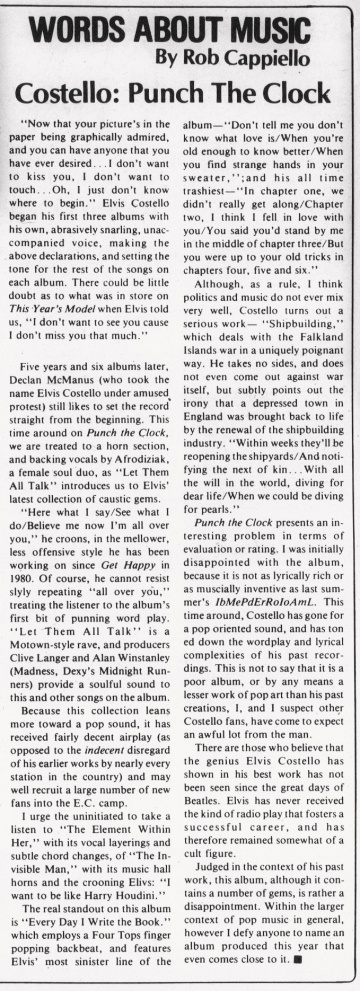|
"Now that your picture's on the paper being graphically admired, and you can have anyone that you have ever desired ... I don't want to kiss you, I don't want to touch ... Oh, I just don't know where to begin." Elvis Costello began his first three albums with his own, abrasively snarling, unaccompanied voice, making the above declarations, and setting the tone for the rest of the songs on each album. There could be little doubt as to that was in store on This Year's Model when Elvis told us, "I don't want to see you cause I don't miss you that much."
Five years and six albums later, Declan McManus (who took the name Elvis Costello under amused protest) still likes to net the record straight from the beginning. This time around on Punch the Clock, we are treated to a horn section, and backing vocals by Afrodiziak, a female soul duo, as "Let Them All Talk" introduces us to Elvis' latest collection of caustic gems.
"Here what I say / See what I do / Believe me now I'm all over you," he croons, in the mellower, less offensive style he has been working on since Get Happy in 1980. Of course, he cannot resist slyly repeating "all over you," treating the listener to the album's first bit of punning word play. "Let Them All Talk" is a Motown-style rave, and producers Clive Langer and Alan Winstanley (Madness, Dexy's Midnight Runners) provide a soulful sound to this and other songs on the album.
Because this collection leans more toward a pop sound, it has received fairly decent airplay (as opposed to the indecent disregard of his earlier works by nearly every station in the country) and may well recruit a large number of new fans into the E.C. camp.
I urge the uninitiated to take a listen to "The Element Within Her," with its vocal layerings and subtle chord changes, of "The Invisible Man," with its music hall horns and the crooning Elvis: "I want to be like Harry Houdini."
The real standout on this album is "Every Day I Write the Book." which employs a Four Tops finger popping backbeat, and features Elvis' most sinister line of the album — "Don't tell me you don't know what love is / When you're old enough to know better / When you find strange hands in your sweater,"; and his all time trashiest — "In chapter one, we didn't really get along / Chapter two, I think I fell in love with you / You said you'd stand by me in the middle of chapter three / But you were up to your old tricks in chapters four, five and six."
Although, as a rule, I think politics and music do not ever mix very well, Costello turns out a serious work — "Shipbuilding," which deals with the Falkland Islands war in a uniquely poignant way. He takes no sides, and does not even come out against war itself, but subtly points out the irony that a depressed town in England was brought back to life by the renewal of the shipbuilding industry. "Within weeks they'll be reopening the shipyards / And notifying the next of kin ... With all the will in the world, diving for dear life / When we could be diving for pearls."
Punch the Clock presents an interesting problem in terms of evaluation or rating. I was initially disappointed with the album, because it is not as lyrically rich or as musically inventive as last summer's IbMePdErRoloAmL. This time around, Costello has gone for a pop oriented sound, and has ton ed down the wordplay and lyrical complexities of his past recordings. This is not to say that it is a poor album, or by any means a lesser work of pop art than his past creations, I, and I suspect other Costello fans, have come to expect an awful lot from the man.
There are those who believe that the genius Elvis Costello has shown in his best work has not been seen since the great days of Beatles. Elvis has never received the kind of radio play that fosters a successful career, and has therefore remained somewhat of a cult figure.
Judged in the context of his past work, this album, although it contains a number of gems, is rather a disappointment. Within the larger context of pop music in general, however I defy anyone to name an album produced this year that even comes close to it.
|

